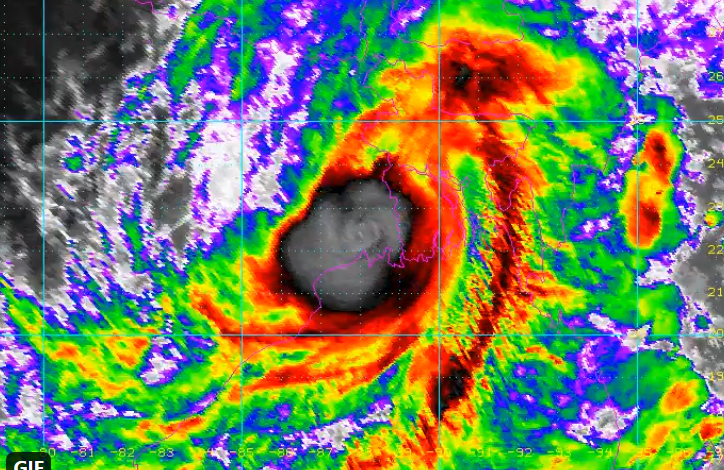
Cyclone Amphan hits India & Bangladesh, already struggling with COVID-19
As I write, the strongest storm ever recorded in the Bay of Bengal has just made landfall in India and Bangladesh.

C: Eric Holthaus via Twitter
As I write, the strongest storm ever recorded in the Bay of Bengal has just made landfall in India and Bangladesh, as a Category 2 storm.
The storm, named Amphan, which attained Super Cyclone status as a Category 5 storm, weakened slightly as it approached land — but has generated a substantial storm surge that is more consistent with a much stronger storm.
It had already reached speeds of 270 kilometers per hour, bringing gale force winds, torrential rain, mudslides, and a storm surge that could be as high as 5 meters or sixteen feet.
The Indian media is reporting that trees have been uprooted and houses destroyed in coastal regions. Breaking news from Aljazeera is that at least five people have been killed so far, and the super storms is “leaving a trail of devastation.” One local resident in India told the news outlet: “Everything is destroyed.”
Millions of people have already been evacuated. But millions more remain in the path. In a briefing note, the US Pacific Disaster Center (PDC) outlined how over 33 million people in India lie in the Amphan’s path, with a further 5 million in Bangladesh. Millions of these face flooding rainfall and a storm surge that could cause “catastrophic damage.”
And often it is the most marginalized people who suffer the most:
My heart is breaking for India and Bangladesh today as Cyclone Amphan makes landfall.
This is the story of the climate emergency over and over and over again: The most marginalized people in the world are bearing the brunt of the worst impacts.
This is such cruel injustice 💔 pic.twitter.com/2FD2X7OEzM
— Eric Holthaus (@EricHolthaus) May 20, 2020
The effect of Amphan will be made worse by the current COVID-19 crisis. Climate change meets pandemic. A double whammy for millions who are already struggling. India currently has over 100,000 cases of the virus; whereas Bangladesh has some 25,000.
Many are already in desperate situation. CNN reports that “Cyclone Amphan could also bring heavy rains to the world’s largest refugee camp in Cox’s Bazar, where almost 1 million Rohingya refugees live after fleeing violence in Myanmar’s Rakhine state.” The camp was already facing the “nightmare” scenario after COVID-19 was detected in the camp. Amphan will only add to this nightmare for the most vulnerable.
We know that in our warming world storms are getting more frequent and more violent.
As Earther reports, Amphan’s arrival “marks the first time on record that super cyclones have been recorded in the Indian Ocean basin in two consecutive years, following 2019’s Super Cyclone Kyarr that formed on the opposite side of the basin. If it [had maintained its intensity], Amphan [would have been] the first super cyclonic storm to hit the Bengal region in more than 20 years.”
Adam Sobel, the director of the Initiative on Extreme Weather and Climate at Columbia University, told Earther that temperatures in the Bay of Bengal are “about as high as is ever observed.”
He added: “There is considerable evidence, from multiple different lines of evidence, that global warming is making cyclones more severe.”
